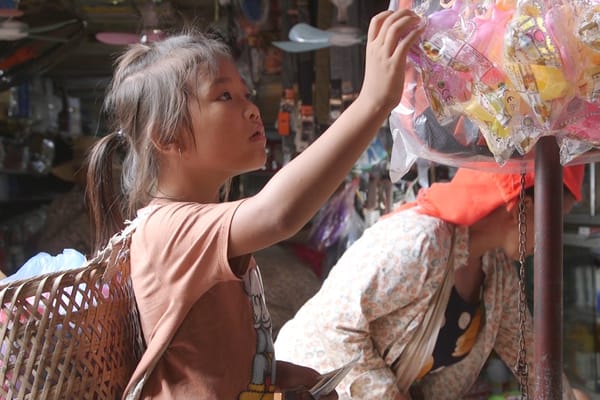PVR, RRR & Indian Box Office; US Releases In China; Oscars Mayhem; SEAFIC Calls It A Day

India may have scored its first huge post-pandemic hit, but the country’s box office has not yet fully recovered and China is still struggling with Covid-induced cinema closures. Meanwhile, the entire planet was obsessing over a slap…
1. PVR, RRR AND THE RECOVERY OF INDIA’S BOX OFFICE
The big news that broke early this week is that two of India’s biggest cinema chains, PVR Cinemas and Inox Leisure, are merging to form a mega-circuit of 1,546 screens. Indian press had earlier reported that PVR was in advanced merger talks with the Indian arm of Mexico’s Cinepolis, but in the end, two family-owned businesses partnered up to face the dual scourge of Covid-induced cinema hesitancy and the rise of streaming.
Ironically, the merger was announced on the same weekend that an Indian film, S.S. Rajamouli’s Telugu-language RRR, had a record-breaking theatrical opening both in India and overseas. Although Indian box office figures are difficult to verify, it’s looking like the film grossed around $65m globally in its opening weekend (March 25-27), including $9.5m from the US. Released in four different versions (Telugu, Tamil, Hindi and Malayalam), the historical action drama is toplined by Telugu cinema stars Ram Charan and N.T. Rama Rao Jr., who play freedom fighters taking on colonial Brits.
Success was always assured – Rajamouli has a devoted fanbase and also directed record-breaking hits Baahubali: The Beginning and Baahubali 2: The Conclusion – but it also points to the rising power of films from the south of India, which so far have been the engine of the country’s box office recovery. According to FICCI EY’s recent ‘Tuning Into Consumers’ report, south Indian films generated three times the box office of Hindi films in 2021, with combined revenues of $317m (Rs24bn) compared to $106m (Rs8bn) for Hindi releases.
There are several reasons for this – the south had fewer lockdowns and more big-budget films that were actually reaching cinemas during the pandemic, as northern Hindi producers were either holding their biggest titles back or selling them to streaming platforms, and anyway these days make fewer of the classic “hero” movies beloved by the south.
There’s also been speculation that the south’s single screen cinemas were less strict than northern multiplexes in complying with seating restrictions. Whatever the reasons, some of India’s biggest hits during the pandemic have been films from the south, including Telugu blockbusters Pushpa: The Rise Part 1 and Ala Vaikunthapurramuloo, and Tamil hits Master and Darbar. [Streamlined will take a closer look at the Hindi market in coming weeks].
Overall, India’s box office reached $515.5m (Rs39bn) in 2021, an increase of 56% compared to 2020, but that is still only 37% of pre-pandemic box office levels. Meanwhile, paid video subscriptions grew by 27% to reach $713.8m (Rs54bn) in 2021, and while those subs are also driven by sports and series, more than 100 films premiered on streaming platforms last year, skipping a theatrical release.
FICCI EY also estimated that India’s screen count decreased by only 1% to 9,423 screens in 2021, but India remains badly under-screened and streaming services are already reaching around 4,000 Indian towns and cities. Both multiplexes and single screen cinemas still face an uphill battle in keeping Indian consumers away from the convenience of smaller screens.
2. US FILMS ENJOY A COMEBACK (OF SORTS) IN CHINA
Over at the China box office, we have the rare sighting of three US films in the top five, but at the time of writing (Friday noon Beijing-time), patriotic blockbuster The Battle At Lake Changjin II, which has been on release since Chinese New Year, had regained the number one slot in Maoyan’s real-time ranking. Moonfall was ranking second and had grossed $12.9m (RMB81.8m) since its release on March 25; followed by The Batman with a cumulative total of $19m (RMB120.3m) since March 18; and Uncharted with a cume of $14.7m (RMB93.4m) since March 14.
These figures are underwhelming thanks to Omicron-induced cinema closures and the Chinese audience’s current ambivalence towards foreign product. According to Artisan Gateway, only around 47% of China’s cinemas are currently operating, as the country battles Covid outbreaks by imposing localised lockdowns, with Shanghai and Jilin the worst affected areas. But at least the pipeline of imports is finally flowing. Other US films that have secured dates in coming weeks include:
- Escape Room: Tournament Of Champions (Sony, April 2)
- Hotel Transylvania: Transformania (Sony, April 3)
- Fantastic Beasts: The Secrets Of Dumbledore (Warner Bros, April 8)
- Ambulance (Universal, April 22)
- The Bad Guys (Universal/DreamWorks, April 29)
Some of these are old films and look like filler, but Fantastic Beasts is opening one week ahead of its North America debut. Japanese live-action romance We Made a Beautiful Bouquet and Indian sports drama Kanaa have also made an appearance in the real-time top ten.
3. OSCARS TRIP OVER ONE-INCH TALL BARRIER…AGAIN
Leaving aside ‘that’ slap, the Oscars reverted to a depressing familiarity this year as best picture went to a feel-good movie, Apple TV+’s CODA, and none of the non-English language films that had been nominated in the major categories actually won in those categories. Japan’s Drive My Car was a worthy winner in the Best International Feature category, but director Ryusuke Hamaguchi had to literally fight the music to stay on stage during his acceptance speech.
Apple winning a best picture Oscar for a sentimental, unchallenging film ahead of that honour ever going to Netflix, which at least put the work in for Alfonso Cuaron’s Spanish-language Roma, does not bode well for the future greenlighting decisions of the streaming giants. It seems like an awfully long time since Bong Joon Ho’s Parasite helped Academy members get past the “one-inch tall barrier of subtitles”. And yet weren’t we all watching Squid Game during the pandemic?
The ceremony wasn’t broadcast in China, ostensibly for political reasons, but then in an age of short video and shorter attention spans, there are big questions over the value of a nearly four hour long awards ceremony for Chinese broadcasters. Chinese audiences (like audiences everywhere), are more interested in edited highlights that can be shared on social media or turned into memes, and in that respect this year’s ceremony delivered handsomely. But all this really just highlights that we are in desperate need of an overhaul of awards ceremonies and the way we recognise and honour films.
4. SEAFIC CLOSES AFTER SIX YEARS OF SUPPORTING SOUTHEAST ASIAN FILMMAKERS
SEAFIC (Southeast Asia Fiction Film Lab) announced that is closing down after concluding its final lab session, SEAFIC Seed Lab, which is taking place as a physical event in Phuket (April 3-9). Founder Raymond Phathanavirangoon explained that the decision resulted from the difficulties in raising funding, compounded by the pandemic, the difficulty in holding in-person events and the rising cost of travel during these uncertain times. Rather than keep the staff hanging around waiting for a new funder, he took the decision to close the non-profit foundation and let the staff look for new jobs.
During its six years of existence, SEAFIC has shepherded 20 projects, five of which have already been shot or are in production, with another five expected to shoot in 2022. One of the lab’s partners, Produire au Sud, plans to continue their Southeast Asia workshops in the future. SEAFIC will continue to post updates on previous selected projects on its Facebook page.
Southeast Asia is currently one of the most world’s most vibrant filmmaking regions as can be seen by the growing number of films winning awards at major festivals – most recently Kamila Andini’s Before, Now & Then in Berlin. The five SEAFIC selected projects currently in post-production or shooting include:
- Autobiography, by Makbul Mubarak (Indonesia)
- Arnold Is A Model Student, by Sorayos Prapapan (Thailand)
- Ajoomma, by He Shuming (Singapore/South Korea)
- Last Shadow At First Light, by Nicole Midori Woodford (Singapore/Japan)
- Cu Li Never Cries, by Pham Ngoc Lan (Vietnam)
Further details of previous SEAFIC selected projects can be found here.
IN OTHER NEWS…
- Japan lost one of its most internationally lauded filmmakers, Shinji Aoyama, who died aged 57 on March 21 in Tokyo following a battle with cancer. Also an accomplished novelist and musician, Aoyama was perhaps best known for black-and-white drama Eureka (2000), which won two prizes at Cannes, while he also won two awards at Locarno – the special jury prize for Tokyo Park in 2011 and best director for Backwater in 2013. He made his debut in 1996 with Helpless, which helped launch the career of actor Asano Tadanobu, and had two films selected for Venice – Korogi in 2006 and Sad Vacation in 2007.
- Egyptian filmmaker Amir Ramses has been appointed director of the Cairo International Film (CIFF) following the recent departure of Mohamed Hefzy as president. Ramses, who was appointed by incoming CIFF president Hussein Fahmy, was previously artistic director of Egypt’s El Gouna Film Festival from 2017 to 2021. As a director, he has credits including Cairo Time (2014) and Curfew (2020). This year’s CIFF is expected to take place in late November.
- Disney+ said it will launch in an additional 42 countries this summer, including South Africa, Turkey, Poland, Hungary and the Middle East, with content including Marvel Studios series Moon Knight, starring Oscar Isaac and directed by Egypt’s Mohamed Diab (the first series that is making Streamlined want to subscribe to Disney+). Launch dates have been set as May 18 in South Africa, June 16 in Israel, and June 8 or June 14 for the other territories.
- Over in India, Disney+ Hotstar said it is working with All3Media International on an Indian adaptation of Irish psychological thriller Blood. Produced by Reliance Entertainment-owned Dreamers & Doers Co, the Indian version of the series will be directed by Mihir Desai with Gurmmeet Singh as showrunner. Created by Sophie Petzal, Blood was produced by Channel 5 and Virgin Media and starred Adrian Dunbar and Carolina Main. It ran for two seasons which aired in 2018 and 2020.
- It was a big week for streaming news from Japan, with Amazon Prime Video announcing six Japanese originals, including a reboot of Takeshi Kitano’s iconic game show, Takeshi’s Castle; a Japanese version of Modern Love, with episodes directed by Kiyoshi Kurosawa, Atsuko Hirayanagi and others; YA romcom My Lovely Yokai Girlfriend, created by Yalun Tu (NCIS: Hawaii) and Zach Hines (Grace); original film Angel Flight, about a group of professionals who repatriate dead people to be buried in their homeland; and second seasons of hit shows The Masked Singer and The Bachelorette Japan.
- Not to be outdone, Netflix showcased highlights from 40 new exclusive anime titles at AnimeJapan 2022, including series Thermae Romae, Novae Kotaro Lives Alone and Rilakkuma’s Theme Park Adventure, along with films such as Bubble, which recently premiered in the Generation 14plus section of Berlin Film Festival. The streamer also revealed sneak peeks of upcoming titles such as The Seven Deadly Sins: Grudge Of Edinburgh and Ghost In The Shell: SAC_2045 Season 2. See more details of the line-up here.
- Netflix also announced wrap of production for the second season of Japanese series Alice In Borderland, directed by Shinsuke Sato and featuring returning cast members Kento Yamazaki, Tao Tsuchiya and Nijiro Murakami, among others, which is scheduled to stream from December. Based on a popular manga, the show has a similar concept to Squid Game in that a group of people compete in a series of games with the losers facing death, although they are motivated by a desire to return home rather than paying off debts. As ten cast members are returning for season two, we can assume they’re quite good at playing the game. Squid Game’s creator has also said he was influenced by Japanese manga.
- Amazon Prime Video also announced it has commissioned its first Australian original feature, romantic comedy Five Blind Dates, created by US comedian Nathan Ramos-Park and China-born Australian actor Shuang Hu, with Australia’s Shawn Seet (The Code, Storm Boy) set to direct. The story follows a woman who is told by a fortune teller that she will meet her soulmate on one of the next five dates she goes on. Produced by Goalpost Pictures Australia, the series starts shooting next month in Sydney and Queensland. The announcement was made by Amazon’s head of originals for Asia Pacific, Erika North, at Screen Producers Australia’s annual conference.
- Deadline reported in an exclusive that Indian screenwriter Anubhav Chopra will be the lead writer on upcoming web series Dirty Laundry, a crime action drama from Indonesian film and sinetron producer SinemArt. Chopra, who will work with a team of Indonesian writers, previously co-directed Netflix documentary series House Of Secrets: The Burari Deaths. He is repped by Indian writers’ agency Tulsea, which is expanding in the Asia Pacific region.
- And finally, Variety reported that Chinese visual effects studio BaseFX has filed a lawsuit in Los Angeles alleging that it has been the victim of two American conmen, Remington Chase and Kevin Robl, who have stolen $234m from investors, many of whom are now chasing the Beijing-based studio for the missing funds. Founded by American Chris Bremble, BaseFX has successfully worked on many US studio productions and recently co-produced Chinese animated feature Wish Dragon with Sony. The studio has many good people working for it. It would be a shame for this to blow up as yet another film industry cautionary tale.




